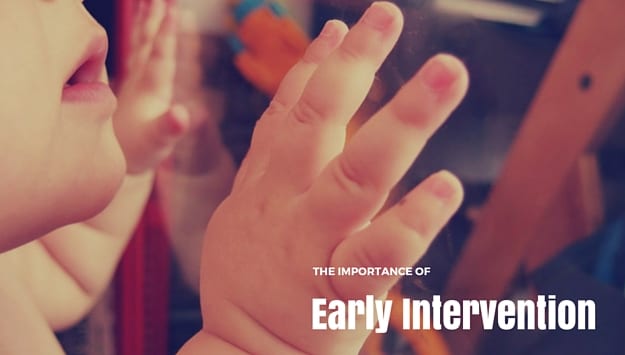Early Intervention for Our Special Needs Kids

At our oldest son’s 18-month check-up, I filled out the M-CHAT, a checklist of milestones that help pediatricians assess if a child is at risk for a developmental delay or autism at 18 or 24 months.
As I started ticking off things he wasn’t doing, it was apparent that we needed help. Despite our endless hours spent reading and talking to him, he wasn’t talking or pointing; it was terrifying to look at all of the things he wasn’t doing when my friends’ children were acquiring more and more vocabulary every time we saw them.
By the end of the appointment, my pediatrician had our referral to Early Intervention ready to go. I walked out of the pediatrician’s office anxious and unsure of what to do next and feeling a bit lost and intimated by the idea of how do we do this. I had questions, so many questions, and I was at a loss as to what to do next. It turns out that the people I worked with at Early Intervention were exactly what we needed.

How Does It Work?
Early Intervention is a program through the State of Alabama that provides services to children birth to age three with developmental delays or disabilities. The testing and the services are all provided at no cost. That’s right: they’re free. The state provides these services to children in all 67 counties and the service providers come to the child’s home (or other location, depending on need) on a schedule coordinated with the parents.
After our initial referral by his pediatrician, the program sent someone to my home to test my son to see where his specific delays were and how significant they were so that we could determine eligibility and then develop a plan for meeting his needs. Even though my son’s obvious delay was in speech, the tester looked at five areas of development: adaptive, social/emotional, speech, cognitive, and physical. A child is classified as having a delay if he or she scores with a 25% or greater delay in a particular area. We knew if he qualified before the tester left and I heard from his service coordinator soon after that.
With our service coordinator, we constructed an IFSP, an Individualized Family Service Plan. That IFSP took our family environment, resources, and the services EI could provide into consideration as we determined the schedule for his services as well as what my husband and I could do with him at home to support the speech therapist. We would adjust the plan as needed, especially after his speech therapist evaluated him at certain intervals.
Once a child turns three, the local school system takes over providing services. Our service coordinator went with me to a meeting with the school system to help with the transition. She helped me understand the process of moving from EI to the school system, especially as we had to write the first (of many) IEPs for my son who had yet to start school but was now under their auspices. I was sad to say goodbye to her and his speech therapist when he turned three, but what they had provided me in time we had been with them was invaluable in that transition from toddler to preschooler.

Early Intervention Results
In the 18 months we were with Early Intervention, my son received weekly speech therapy for free. He learned to sign first and then began talking after his second birthday. By the time he turned three, he was using multiple words and two- or three-word phrases. The difference that Early Intervention made for him and for us as a family cannot be overstated. My husband and I learned things we could do to support what he was learning. We learned that we were not alone in this. We learned that there were people out there who could help and wanted to help. In a time where we felt isolated by the uncertainty of having a child with a developmental delay, Early Intervention was the key to getting over the hump and getting on with the business of helping him learn and grow, regardless of what he could and could not do.
Things to Know
- You don’t need a pediatrician’s referral to access Early Intervention and its services. In the Madison County area, you can contact United Cerebral Palsy-Huntsville or the ARC or the Alabama Department of Rehabilitation Services to inquire about setting up services for your child through Early Intervention.
- Early Intervention provides services free of charge and is confidential. You don’t have to let anyone know that you are getting services through EI and all of your information is private. You also are not obligated to transition to your local school system once your child turns three.
- All services are optional. If you want to discontinue services, you may do so at any time. If you disagree with an evaluation, you are not obligated to continue with Early Intervention or the provided services.
- All of the providers that work with Early Intervention are there because they want to help you and your child. The goal is to help you get your child ready for starting school. Research shows that the earlier a child receives help, the better the chance for a positive outcome long term. Not only will the providers help you and your child with whatever delay he or she might have, but they will also teach you how to advocate for your child and your family going forward.
Read more posts about raising children with special needs in Huntsville HERE.
Jennifer Kelly grew up in the Birmingham area, but migrated to Huntsville for graduate school and put down roots after meeting her husband, Jamie. In addition to being a mom to her two boys, she is a tennis ninja, trivia nerd, freelance editor, and aspiring writer. You can visit her at The Sir Barton Project, a blog about her upcoming book.





